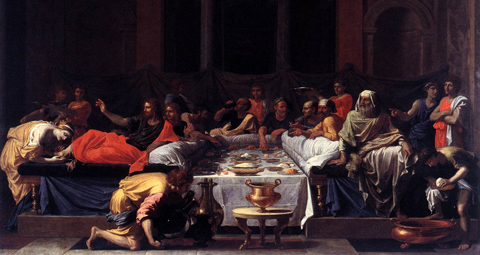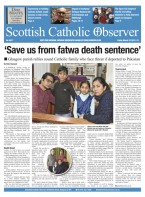March 8 | ![]() 0 COMMENTS
0 COMMENTS ![]() print
print

Rediscovering the Sacraments
Archbishop Leo Cushley launches a new series looking at how God’s saving grace is imparted on us.
While the Baroque painter Nicolas Poussin (1594– 1665) was born in Normandy and resided in Rome, he seemed to spend much of his creative life inhabiting a lost golden age of antiquity.
“I fear the malignity of our times,” he wrote in 1648. “Virtue, conscience and religion are banished among men. Nothing but vice, trickery and self-interest reign. All is lost.”
Nihil novi sub sole! There is nothing new under the sun (Ecclesiastes 1:9).
Where then is the wearied human soul to find solace amid the perennial trials and travails of daily existence?
Thankfully, Poussin himself gives us a clue. On the ground floor of the National Gallery of Scotland in Edinburgh you’ll find his great septet of paintings: The Seven Sacraments. The inspiration for each work is drawn from either Sacred Scripture or, in two cases, the life of the early Church.
Poussin was renowned for his fastidious commitment to historical accuracy. Hence each painting affords us a vivid depiction of the undoubted centrality of the sacramental life to Christianity from earliest times.
What is a Sacrament? A Sacrament is a visible sign of the hidden reality of salvation: the unfolding of God’s creation, the Old Covenant with the people of Israel, the incarnation of Jesus Christ, the divine foundation of the Catholic Church. Each could be rightly described as ‘a Sacrament.’
In this article, however, we are focussing upon the next sacramental step in that unfolding story of God’s loving plan for our salvation: the Seven Sacraments of the Church, each instituted by Christ himself. They are: Baptism, Confirmation, the Eucharist, Penance, the Anointing of the Sick, Holy Orders and Matrimony.
“The saving work of his [Christ’s] holy and sanctifying humanity is the Sacrament of Salvation, which is revealed and active in the Church’s Sacraments,” says the Catechism of the Catholic Church. “The Seven Sacraments are the signs and instruments by which the Holy Spirit spreads the grace of Christ the Head throughout the Church which is his Body.”
Let’s take the Sacrament of Penance by way of an example. Christ confers His authority to forgive sins upon His apostles on Easter night, ‘For those whose sins you forgive, they are forgiven; for those whose sins you retain, they are retained.’ (John 20:23)
Poussin’s Penance retells the encounter between Jesus and the sinful woman in the home of Simon the Pharisee foreshadowing, as it did, the institution of the Sacrament itself.
The historical details are all very Roman with guests reclined on couches and gathered around a sizable banqueting table.
The artist’s composition creates a symmetry between the host’s feet being washed by a hired servant—a courtesy unafforded to his guest—while Christ’s feet are washed by the tears of our female penitent before they are wiped dry by her flowing red hair.
“For this reason I tell you that her sins, her many sins, must have been forgiven her, or she would not have shown such great love,” says Christ to his astonished host (Luke 7:47).
Two millennia later and the same divine drama is played out every time we frequent the Sacrament of Penance. Our sins are confessed. True sorrow is expressed. Jesus forgives us. “I absolve you from your sins in the name of the Father, and of the Son and the Holy Spirit,” says the priest in persona Christi, in the person of Christ.
So it is with all seven Sacraments. Through them Christ bestows upon us the supernatural grace proper to each Sacrament. What is more, they do so in a way that affirms the incarnational reality of the Christian story. Christ was true God but also true man. We are spiritual beings, yes, but we are also physical creatures too.
Thus God seeks to heal us, love us, save us through the physical matter of each Sacrament: the pouring of water, the anointing with oil, the laying on of hands, the spouses seeking marriage, the bread and wine that becomes the body, blood, soul and divinity of Jesus Christ during the Holy Mass. God is not distant from us. He walked the earth. Just look at those Biblical scenes of Poussin. As then, so now.
The seven Sacraments are outward signs of inward grace that make present salvation history in a very real way. They are God’s saving grace imparted to us through His chosen instruments: His Holy Church and His sacred minister.
As we embark upon Lent 2019, how wonderful it would be if we each rediscover the reception of the Sacraments as sacred moments that restore us to right relationship with Almighty God and our brothers and sisters in the Mystical Body of Christ.










